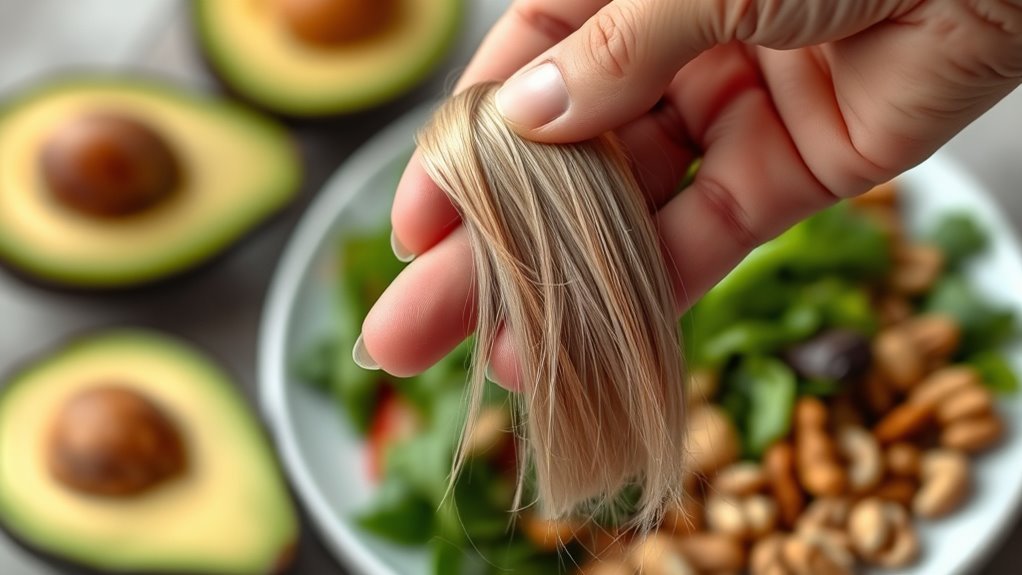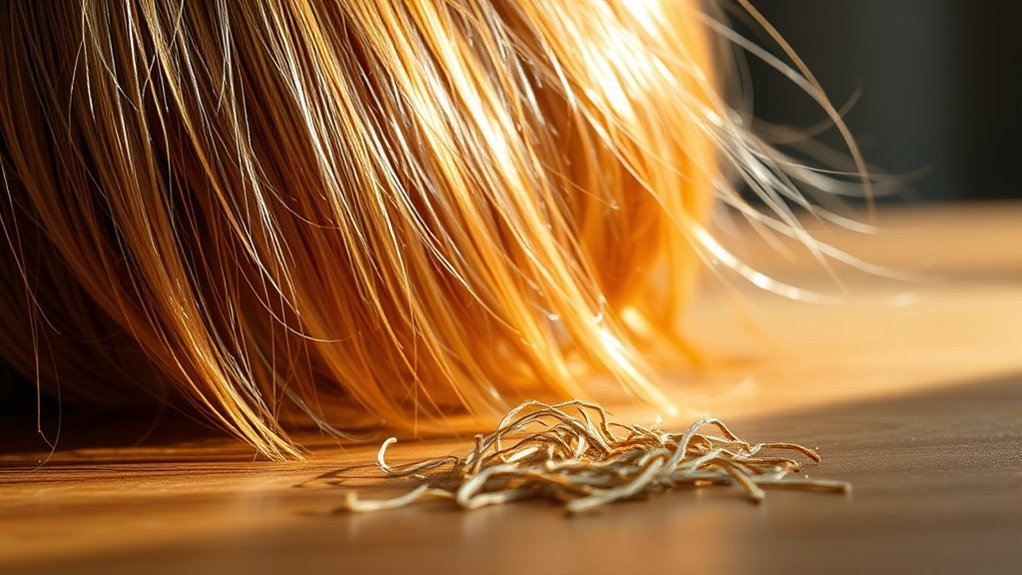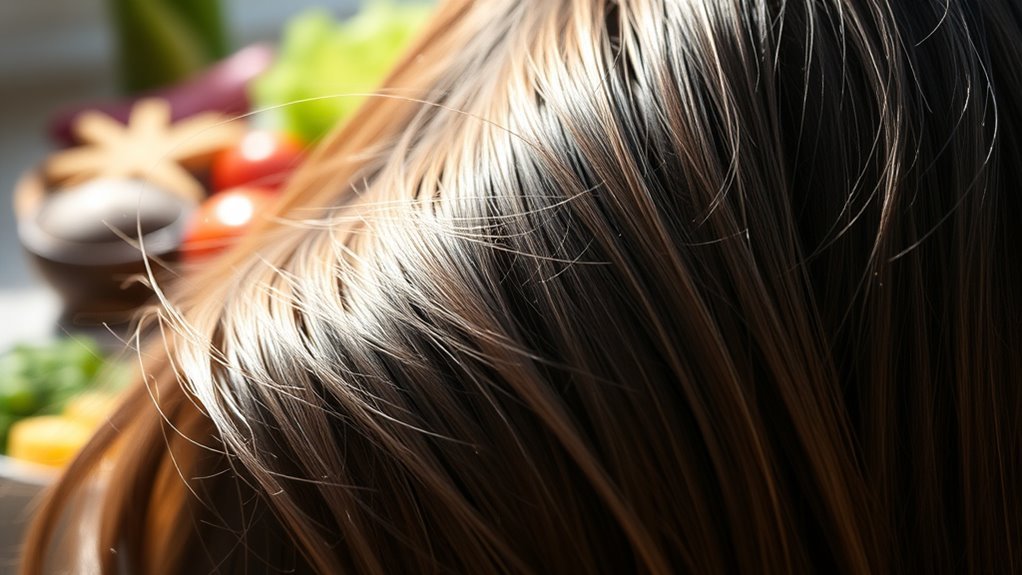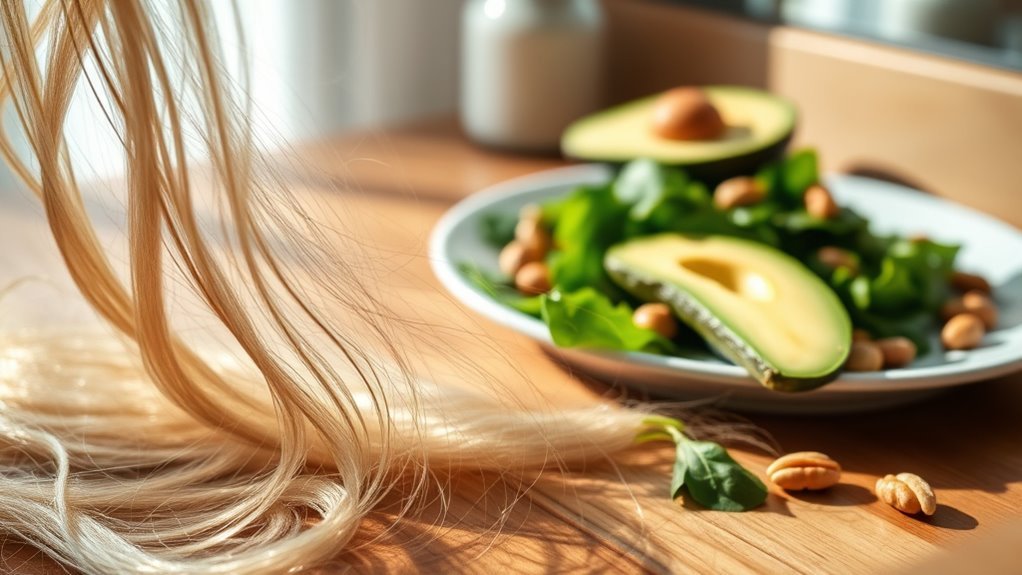The ketogenic diet can cause hair loss for some people due to potential nutritional deficiencies and significant dietary changes. When you reduce carbs drastically, you might miss out on essential vitamins and minerals that support hair health, like biotin and iron. Stress from weight loss and hormonal shifts can also contribute. It’s important to balance your nutrients and manage stress to help maintain your hair. Discovering more about the underlying causes can provide further insight.
Understanding the Ketogenic Diet

When you immerse yourself in the ketogenic diet, it’s important to grasp its fundamental principles. The keto diet focuses on drastically reducing carbohydrate intake and replacing it with healthy fats, which shifts your body into a state of ketosis, where it burns fat for fuel. However, it’s essential to address common keto misconceptions—like the belief that all fats are good or that this diet is unsustainable long-term. In reality, the sustainability of any diet hinges on balanced nutrition. Incorporating a variety of nutrient-dense foods is vital to support overall health. This approach not only helps in achieving weight loss goals but also fosters a lifestyle that can be maintained for the long run, granting you the freedom to enjoy your food choices.
The Science Behind Hair Growth

Understanding the science behind hair growth is essential for anyone concerned about their locks. Hair goes through a cycle of growth, rest, and shedding, and specific nutrients play an important role in maintaining this cycle. By ensuring you get the right vitamins and minerals, you can support healthy hair growth and potentially mitigate loss.
Hair Growth Cycle
Although you might not realize it, the hair growth cycle is a complex process that plays an essential role in maintaining healthy hair. This cycle involves three main growth phases—anagen, catagen, and telogen—each contributing uniquely to hair health. Hair follicles undergo these phases continuously, influencing hair density and shedding patterns.
Here’s a simple breakdown of the hair growth phases:
| Phase | Duration | Description |
|---|---|---|
| Anagen | 2-7 years | Active growth phase |
| Catagen | 2-3 weeks | Changeover phase |
| Telogen | 3 months | Resting phase before shedding |
Understanding these growth phases can help you recognize changes in your hair and make informed choices about your hair care, especially if you’re considering a diet change like keto.
Nutrients for Hair Health
To maintain healthy hair, it is crucial to guarantee you’re getting the right nutrients, as they play an important role in the hair growth process. Among these, biotin benefits are well-documented; this B-vitamin helps strengthen hair and promotes growth. A deficiency can lead to thinning hair, so consider incorporating biotin-rich foods like eggs and nuts into your diet. Additionally, don’t overlook omega-3s importance. These fatty acids nourish hair follicles and reduce inflammation, creating a healthy scalp environment. You can find omega-3s in fatty fish, flaxseeds, and walnuts. Emphasizing these nutrients not only supports hair health but also empowers you to take control of your well-being. Prioritizing balanced nutrition is key to achieving the luscious locks you desire.
How Nutritional Deficiencies Affect Hair

When your diet lacks essential nutrients, it can lead to significant changes in hair health. Nutritional deficiencies can hinder nutrient absorption, resulting in weakened hair follicles and potential hair loss. Here’s a quick overview of key vitamins and their importance:
| Vitamin | Role in Hair Health |
|---|---|
| Biotin | Promotes hair growth |
| Vitamin D | Stimulates hair follicles |
| Iron | Supports oxygen transport |
Deficiencies in these vitamins can disrupt the hair growth cycle. For instance, insufficient biotin may lead to thinning hair, while a lack of iron can cause brittle strands. Addressing vitamin deficiencies is vital for maintaining vibrant, healthy hair, allowing you the freedom to express yourself through your hairstyle.
Possible Causes of Hair Loss on Keto
As you begin a ketogenic diet, you might notice changes in your hair that could be concerning. One possible cause of hair loss is an imbalance in nutrient intake. When you shift to keto, the drastic reduction of carbohydrates can lead to deficiencies in essential vitamins and minerals, impacting hair health. Additionally, stress factors like the sudden dietary change or weight loss can trigger telogen effluvium, a temporary form of hair loss. It’s vital to maintain a nutrient balance by incorporating a variety of low-carb vegetables and healthy fats, ensuring your body gets what it needs. If hair loss persists, consider consulting a healthcare professional to explore other potential underlying issues and find the best solutions for your situation.
The Role of Protein in Hair Health
While many factors contribute to hair health, protein plays an essential role that shouldn’t be overlooked. Hair is primarily made up of keratin, a protein, which means adequate protein intake is important for maintaining its strength and structure. When you’re on a keto diet, make sure you’re choosing high-quality protein sources, like lean meats, fish, eggs, and plant-based options, to provide the amino acids your body needs. Amino acids are the building blocks of proteins and are necessary for hair growth and repair. Insufficient protein can lead to hair thinning or loss. By incorporating a variety of protein sources into your meals, you can support your hair’s health while enjoying the freedom that comes with a balanced keto lifestyle.
Hormonal Changes and Their Impact
Hormonal changes can considerably impact hair health, often leading to thinning or loss. When you’re on a keto diet, hormonal fluctuations can occur, potentially triggering a stress response that affects your hair. Here are a few ways these changes can influence hair:
- Increased cortisol levels may disrupt hair growth cycles.
- Insulin sensitivity shifts can affect nutrient absorption essential for hair health.
- Thyroid hormone imbalances can lead to hair thinning.
Understanding these connections is important for anyone considering or currently following a keto lifestyle. While hormonal changes are a natural part of life, being aware of their potential impact can empower you to make informed choices about your health and well-being.
Managing Hair Loss While on Keto
If you’re experiencing hair loss on a keto diet, it’s essential to take proactive steps to manage it effectively. Start by considering hair supplements that contain biotin, zinc, and other nutrients known to promote hair health. These can help fill any nutritional gaps that might arise from dietary changes. Additionally, stress management is vital; high stress can exacerbate hair loss. Incorporate mindfulness techniques, such as meditation or yoga, to help reduce stress levels. Ensuring you get enough sleep and engaging in regular exercise can also lead to improved overall well-being, which may positively impact hair growth. By focusing on these strategies, you can take control of your hair health while enjoying the benefits of a keto lifestyle.
Foods to Support Healthy Hair on Keto
To support healthy hair while following a keto diet, it’s important to incorporate nutrient-dense foods that provide essential vitamins and minerals. Focus on including a variety of nutrient-rich snacks and keto-friendly oils to nourish your hair from within. Here are some great options:
- Avocado: Packed with healthy fats and vitamin E, it promotes scalp health.
- Nuts and seeds: Almonds, walnuts, and flaxseeds offer omega-3 fatty acids and biotin, vital for hair growth.
- Coconut oil: A versatile keto-friendly oil that helps moisturize the scalp and reduce protein loss in hair.
When to Seek Professional Help
Wondering when it’s time to seek professional help for hair loss while on a keto diet? It’s essential to recognize the signs of thinning hair, which may include increased shedding, noticeable bald patches, or hair that feels thinner overall. If you notice these signs persistently, it’s wise to consult a healthcare professional. They can help identify any underlying issues, whether it’s related to your diet, nutritional deficiencies, or other medical conditions. Remember, taking action early can make a significant difference. Don’t hesitate to reach out for guidance; your hair health is important. Embracing freedom in your dietary choices should also include being proactive about your wellness. A professional can provide tailored advice to help you achieve and maintain both health and hair vitality.
Frequently Asked Questions
Can Switching Back to Carbs Reverse Hair Loss From Keto?
Switching back to carbs can potentially reverse hair loss from keto. Think of your hair as a garden; when you introduce the right nutrients, it thrives again. Carb reintroduction effects may stimulate hair growth by providing essential glucose, which fuels cellular functions. While results can vary, many find that rebalancing their diet helps restore their locks. It’s all about creating freedom in your eating habits and nurturing your body’s needs for peak health.
How Long Does Hair Loss Typically Last on a Keto Diet?
Hair loss on a keto diet typically lasts a few months, with many experiencing temporary shedding. This phase often occurs as your body adjusts to a new nutritional state. Fortunately, most people see hair regrowth within six to twelve months as their bodies stabilize. Staying well-hydrated and ensuring you’re getting enough nutrients can support this process, helping you maintain that sense of freedom in your lifestyle while promoting healthier hair.
Are Certain Hair Types More Affected by Keto-Related Hair Loss?
Certain hair types might be more affected by keto-related hair loss. Fine hair is generally more susceptible due to its delicate structure, while curly and thick hair may show resilience. Straight hair can also experience thinning, but it often depends on individual factors like genetics and overall health. If you’re concerned about hair loss on keto, consider monitoring your nutrient intake, as deficiencies can impact all hair types differently. Balancing your diet is key.
Does Age Impact the Likelihood of Hair Loss on Keto?
Age can definitely impact the likelihood of hair loss on keto. As you get older, hormonal changes can affect hair growth, making you more susceptible to thinning hair. However, it’s important to remember that not everyone will experience this; some may even find their hair improves. Staying informed and monitoring your body’s response to dietary changes can help you navigate any potential issues while enjoying the freedom that the keto lifestyle offers.
Can Supplements Help Prevent Hair Loss While Following Keto?
Yes, supplements can help prevent hair loss while you’re following keto. Biotin benefits are well-documented, promoting hair strength and growth. Since keto may lead to nutrient deficiencies, especially in vitamins and minerals, adding supplements can fill those gaps. Consider incorporating a multivitamin, omega-3 fatty acids, and zinc to support overall health. Just remember, it’s crucial to consult with a healthcare professional before starting any new supplement regimen to verify it’s right for you.
1. Does following a ketogenic diet lead to hair loss?
While some individuals may experience hair loss when starting a ketogenic diet, it is not a universal side effect. Hair loss can occur due to various factors including rapid weight loss, nutrient deficiencies, and hormonal changes. The transition to a ketogenic diet can cause a temporary shock to the body, leading to a condition called telogen effluvium, where hair follicles enter a resting phase. This is usually reversible once the body adjusts to the new diet.
2. What nutrients are important for preventing hair loss on a keto diet?
To minimize hair loss while on a ketogenic diet, it’s essential to ensure you are getting enough essential nutrients. Key nutrients include biotin, zinc, omega-3 fatty acids, and vitamins A, D, and E. Incorporating foods rich in these nutrients, such as avocados, nuts, seeds, fish, and leafy greens, can help support hair health. Additionally, considering a multivitamin or specific supplements may also be beneficial if dietary intake is insufficient.
3. How long does hair loss last after starting a keto diet?
For many individuals, hair loss experienced during the initial phases of a ketogenic diet can last anywhere from a few weeks to several months. This is typically a temporary condition. Once the body adapts to the diet and nutrient levels stabilize, hair growth often resumes. It’s important to manage stress levels and maintain a balanced diet to support recovery during this period.
4. Can I prevent hair loss while on a keto diet?
Yes, there are several strategies to help prevent hair loss on a ketogenic diet. First, ensure that you are consuming a well-rounded diet rich in healthy fats, proteins, and essential vitamins and minerals. Staying hydrated and managing stress can also play a crucial role in maintaining hair health. Additionally, regular scalp massages and avoiding harsh hair treatments can help promote circulation and strengthen hair follicles.
5. When should I consult a healthcare professional about hair loss on keto?
If you experience significant hair loss that continues for an extended period or if you notice other concerning symptoms such as scalp irritation or changes in skin health, it’s advisable to consult a healthcare professional. They can help determine if there are underlying issues such as nutritional deficiencies or hormonal imbalances that need to be addressed. Early intervention can be key in managing hair loss effectively.
References
- https://www.ncbi.nlm.nih.gov/pmc/articles/PMC6019055/
- https://www.healthline.com/nutrition/keto-diet-hair-loss
- https://www.verywellhealth.com/does-the-keto-diet-cause-hair-loss-5198289
- https://www.ncbi.nlm.nih.gov/pmc/articles/PMC7762873/
- https://www.webmd.com/diet/obesity/ss/slideshow-keto-diet-hair-loss
- https://www.mayoclinic.org/healthy-lifestyle/nutrition-and-healthy-eating/expert-answers/keto-diet/faq-20461947


